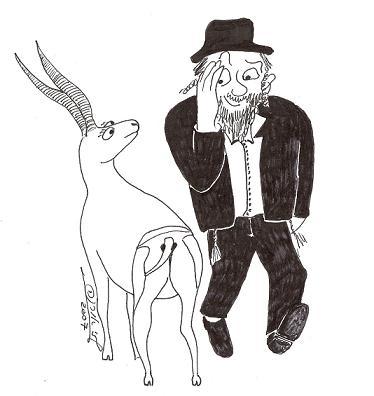
If a man has sexual relations with an animal or a woman has brought an animal to have sexual relations with her, the animal, the man, and the woman are all sentenced to death (by stoning). It is written “And if a man lie with a beast, he shall surely be put to death, and you shall slay the beast. And if a woman approach any beast and lie down for it, you shall kill the woman and the beast: they shall surely be put to death; their blood [shall be] upon them” (Leviticus 20:15-16). The Scripture mandate killing the animal, even though it cannot make choices and is not obligated to fulfill the commandments. Why do the Scriptures punish the innocent animal with death?
The sages gave two reasons. One, the animal had caused a mishap — because of it, a man has died. Two, it caused disgrace and shame. If we did not kill the animal it would walk about the city and people would gossip and say “That’s the animal X was stoned to death over.”
The sages raised a question: To kill an animal, are both reasons — mishap and disgrace — needed, or is one enough to seal the fate of the animal? The scholars asked a sage, Rav Sheshet: what is the rule when a gentile has had sexual relations with an animal? In this case there is indeed a mishap (for gentiles, too, are sentenced to death for sexual relations with an animal), but there is no disgrace, for it is the custom of gentiles to have sexual relations with animals and they are not ashamed of it. Rav Sheshet answered that one reason is sufficient; it is enough that a man came to mishap because of the animal to decree the animal’s death. Therefore, if a gentile has sexual relations with an animal the animal, too, must be killed. The scholars continued and asked: if so, if the “mishap” is sufficient for killing the animal, why is it that if a man bows to an animal and treats it as divine the man must be killed, but not the animal? In this case, too, the animal caused a mishap. A different sage, Rava, answered that an animal is killed when a person has sexual relations because, aside from causing a mishap, the animal enjoys it, which is not the case when a person worships an animal. Another sage, Rav Hamnuna, asked: what is the rule if a Jew accidentally had sexual relations with an animal (it would be interesting to know when this happened). Is the animal sentenced to death or not? In this case the person is disgraced and embarrassed, but there is no mishap, for the person is not killed. (There is no death penalty for acts committed accidentally.) A different sage, Rav Yosef, answered that disgrace is enough to warrant the death of the animal. He brought proof for his words from a different, accepted law which states that an animal with which a girl over the age of three mates is killed, though the girl herself is not killed (for she is not punishable until she is 12 years old). This means that even if there is shame but no mishap, as in this case where the girl is not killed, the animal is still killed. The scholars rejected this proof and argued that in principle there is mishap in this case, too, because the girl consciously had sexual relations with the animal, and she would have received the death penalty were it not that G-d took pity on her. One sage, Rava, also thought that disgrace was enough to demand the death of the animal. He brought as proof of his words the accepted law which rules that if a boy under the age of nine has sexual relations with an animal, the animal is killed. In this case there is no mishap (a boy under the age of 13 is not punished), only shame, yet the animal is killed. This proof, too, was rejected by the scholars, who argued that this case also represents a mishap, as the boy consciously had sexual relations with the animal, and he would have received the death penalty were it not that G-d took pity on him. (Thus the discussion ends, with no decision.)
(Babylonian Talmud, Tractate Sanhedrin 54-55b)
